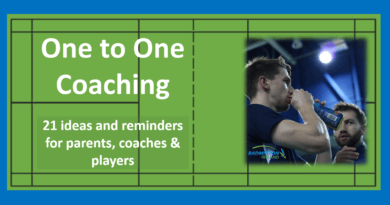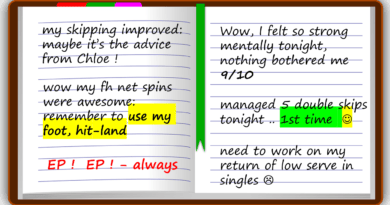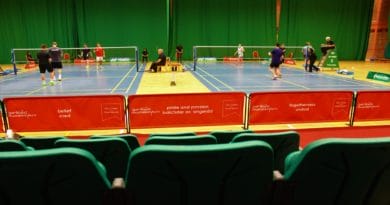6 Ways to Prepare & Practice for the Big points
Have you ever experienced that BIG POINT feeling on court?
Those points when your emotions take over your and normal thinking is just not possible.
The ability to play these Big Points often separates good from great players.
If you have felt panic, or helplessness at the situation on the scoreboard then these 6 points are here to help you.
You may feel different on the Big points because you recognise something about the situation.
You realise how it has importance for you
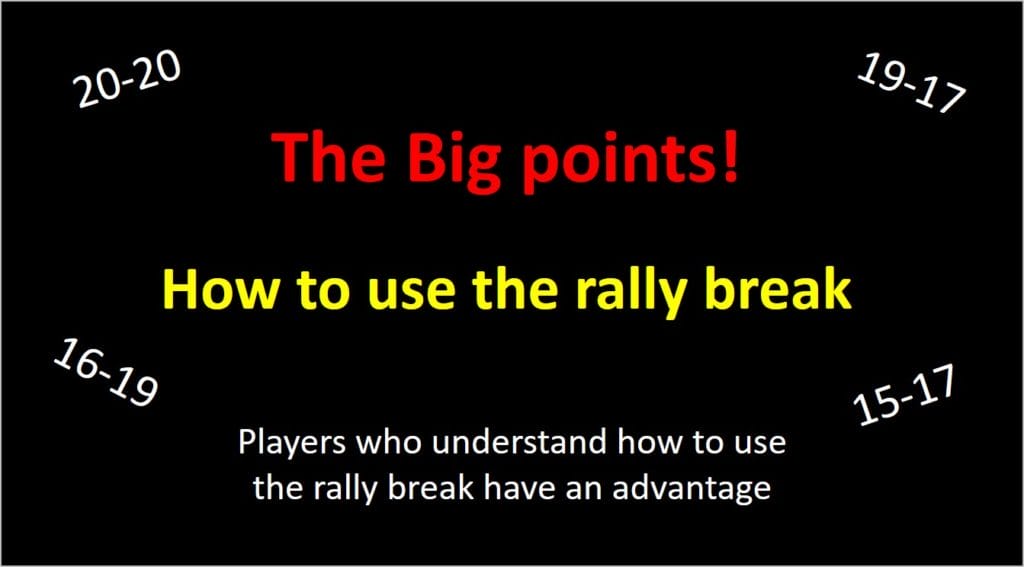 This post is about how to prepare and improve yourself away from competition. There are a few ideas about what to do in those moments before serving, however, I will write more in another post. Look out for one called “6 Ways to use the rally break”.
This post is about how to prepare and improve yourself away from competition. There are a few ideas about what to do in those moments before serving, however, I will write more in another post. Look out for one called “6 Ways to use the rally break”.
I’ve seen many games where players take a lead and seem to be on a path to winning. Then at 18-15 up they lose 1 point and proceed to make error after error. Different shots and tactics suddenly appear, the shuttle is hit outside the court from simple kill opportunities and they seem lost over how to play.
What advice would you give to players when they are in these stressful situations?
– – – – – – – – – – – – – – – – – –
1 Learn to Love them
2 Recognise them
3 Practice with intent
4 Quick ideas & prompts
5 Ask a friend
6 Have a plan
Whichever of these suggestions you choose to use, I recommend that you rehearse and practice them. This should be done in practice, at home and in competitions.
It’s important to use all 3 opportunities. Take charge of your own development.
Coaches create a plan for the players to follow.
– – – – – – – – – – – – – – – –
1 Learn to love them
 This is very important. All the following points are leading to this moment. You need to ‘want’ to have that Big Point feeling. The feeling that tells you that “This is My Time and I know what to do”.
This is very important. All the following points are leading to this moment. You need to ‘want’ to have that Big Point feeling. The feeling that tells you that “This is My Time and I know what to do”.
If you are struggling with feeling comfortable playing Big Points then use the tips below. Remember, you are feeling this way because you recognise something about the situation. These moments generally happen because you have put yourself in a situation that has importance for you. It is possible to have a plan and change your outlook.
Become that Big Point player, the one who knows how to control themselves, the situation, has a plan and enjoys (wants) that feeling!
– – – – – – – – – – – – – – – –
2 Recognise them
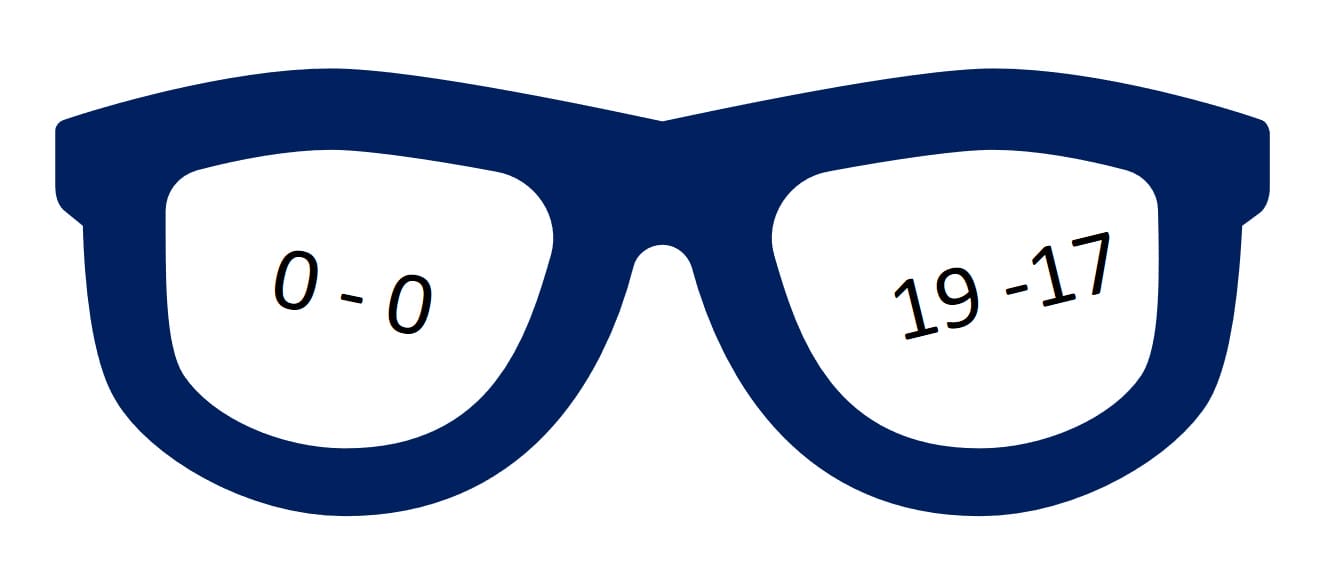 You may think that Big points only happen at match or game points. However, there are many occasions in a match that could be considered a ‘Big Point’. The definition I like is anything that feels different or stands out from other parts of the match. So different that it triggers strong emotions within you.
You may think that Big points only happen at match or game points. However, there are many occasions in a match that could be considered a ‘Big Point’. The definition I like is anything that feels different or stands out from other parts of the match. So different that it triggers strong emotions within you.
It’s your emotions that will influence your performance. For some of you, it could be the 1st point in an important match. It could even be when you are serving at 17-16 after leading 17-13. How would that make you feel?
Your changing emotions can easily affect you in many ways. The decisions you make can be influenced, your memory to recall a game plan can disappear, your ability to control your power can suddenly disappear. Most worryingly for you as a player, you may decide to try something completely new in the match.
Receiving serve at a Big Point, have you ever thought “it’s time I played that crosscourt slow drop shot to catch them out”. Even though you had never played it before in the match!
The following sections will give you things to think about, practices to try out and hopefully make you aware of the actions you could take.
 Questions
Questions
- What situations do you consider to be Big points?
- Can you describe the emotions that they create?
- What happens to you?
Go and find a pen and write down a few words that describe these moments in a match that create emotions in you.
How long is your list?
– – – – – – – – – – – – – – – –
3 Practice with intent
If you want to be good at playing the big points you need to practice. The question is what to practice and how to practice.
Being told to ‘Focus’ at the Big points or when your mind wanders is not going to work if you haven’t rehearsed what to do in practice. I’ve heard many conversations between coaches and players about the things they have seen on court. Unfortunately though, without ever defining any firm actions or plans for improvement. The often unanswered question is: what should you practice and how should you structure your practice.
Starting lots of practice games from 18-18 is not the solution. Yes, the score may represent a tough situation but it’s your reactions, the emotions that you need to replicate.
Look at the list that you prepared after answering the questions above. Do you include time in your practice to try and replicate those Big point feelings and the situations they occurred in?
What to include in your practice
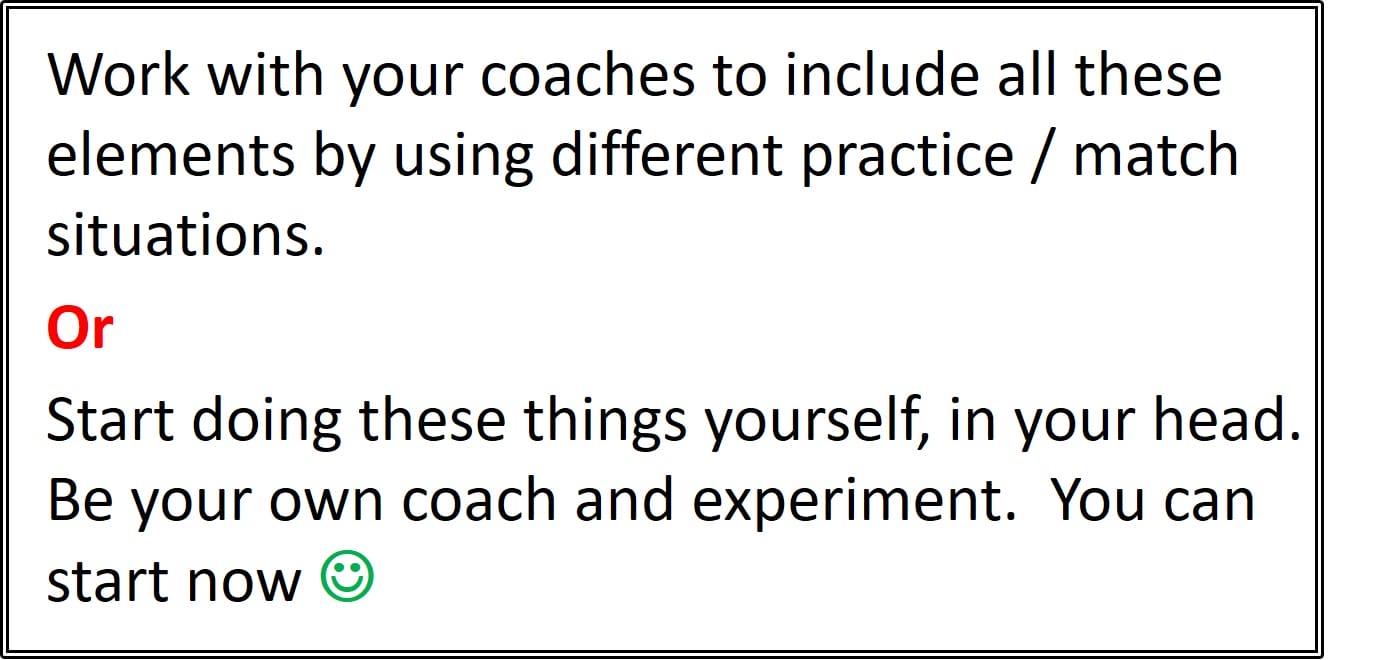 I recommend that to become better at playing the big points you need to include and allow for the following elements in your practice – on and off the court
I recommend that to become better at playing the big points you need to include and allow for the following elements in your practice – on and off the court
- Matches against players in game-like conditions. With scoring & played to win, free choices, desire
- Conditioned games that have the objective of stressing you or testing you
- Off court thinking and preparation time – see the ideas here
- Use rituals and routines – on and off the court
- A desire to try new things – be brave if you wish to succeed
- Confidence to work through ideas – try, test, review, change if required
Your practice opponents do not always need to know that you are working on your Big point skills
Be your own coach, set your own standards, and choose your own rewards
On Court, in the gym, whilst running
All these tips in this post can be used not only on the court but away from your training hall. You don’t have to wait until it’s ‘match time’. Have you thought about using trigger words, visualisation, breathing or ritual in the gym during your Strength & Conditioning work? Yes, that’s right, self-talk, trigger words and visualisation all work in the gym.
The secret strategy is that no one else needs to know that you are practising!
At Home
Have you thought about using time at home and at practice to help yourself? If you are not preparing for the Big points at home, you are missing out!
You have plenty of time – instead of watching television, in the bath/shower, just before sleeping, a quiet walk. Find a time that works best for you. Using your experiences and then creating strategies will speed up your development.
I would love to hear how you use these quiet times and what works for you.
In Competition or Team Matches
Not all competitions or Team matches are of equal importance. I hope you know that. Your aim should be to define what you want from the event. Yes, aiming to WIN if it is a possible goal. However, you must have some events where you try out or progress your skills. Hopefully, you will recognise the Big Points and your coping thoughts will kick in.
– – – – – – – – – – – – – – – –
4 Quick ideas and prompts
Here are some quick ideas that you can start using today. Hopefully, you may already be using some of them or have developed more of your own. Look out for a post called “6 Ways to use the rally break to prepare yourself” where we will explore each of them and what to do just prior to playing these points.
Self-talk
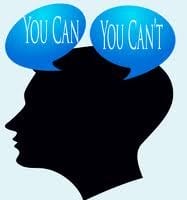 If you have conversations in your head this is a form of self-talk. We all do it, but many of us don’t realise the power it has.
If you have conversations in your head this is a form of self-talk. We all do it, but many of us don’t realise the power it has.
It can take many forms: unstructured and rambling, negative or positive, planned and rehearsed.
I suggest that you try out and develop self-talk strategies with the goal of finding something that works for you. It could include using trigger words but maybe longer.
I know players who prepare key phrases or mantras (phrases that they repeat and trust) and use them before and during matches.
Others are very good at identifying when they need their ‘inner friend/voice’. They actively start a conversation with themselves. This often follows a similar pattern and could use specific words or phrases.
If you are not actively using self-talk (positively) then you are missing out!
Trigger words
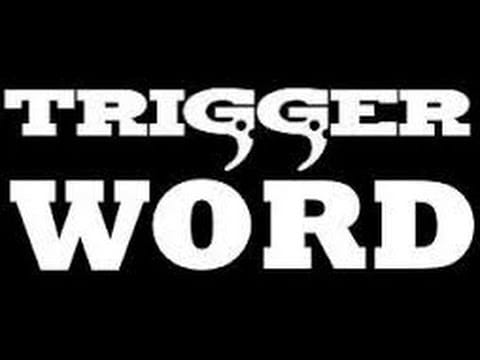 Have you thought about using Trigger words? These are single words or short phrases that you say to yourself. Words that you have practised using and importantly, know that they will work for you. These words said in the right way will trigger a mindset or physical feeling that you desire and enjoy.
Have you thought about using Trigger words? These are single words or short phrases that you say to yourself. Words that you have practised using and importantly, know that they will work for you. These words said in the right way will trigger a mindset or physical feeling that you desire and enjoy.
I recommend that players think about using these short powerful words and phrases. Do you have any favourites? Please write a comment at the bottom and share your thoughts. I’m sure there are players and coaches reading this who need to hear what you have to say.
I will talk more about this in the next post “6 Ways to use the rally break”
Mathematics
If you are leading in a match at say 18-16, have you ever thought of using mathematics to help your mindset?
You need 3 points to win that game, they need 5.
- How does that make you feel?
- If you win the next point how does that change your mindset, you would be leading 19-16
- If you lose the next point, you are still leading 18-17, does that change your mindset?
How you react to these questions is important. Do you focus on the score or the number of points left in that game?
Some players just focus on the points left in that game rather than the score. For them, they see positive thoughts in terms of the points left and who needs how many. In close matches, they like to calculate the effect of winning or losing the next point. They love the ratios of who needs what to win.
Breathe
Everyone needs to breathe, but to do it with purpose and for a reason is different. There are many good reasons for using breathing techniques at critical points. These techniques should also be used before going onto the court and even at home away from the court.
In the future post “6 Ways to use the rally break” we will consider meditation at home, breathing techniques in the warm-up and how to breathe just before playing that Big Point.
– – – – – – – – – – – – – – – –
5 Ask a friend
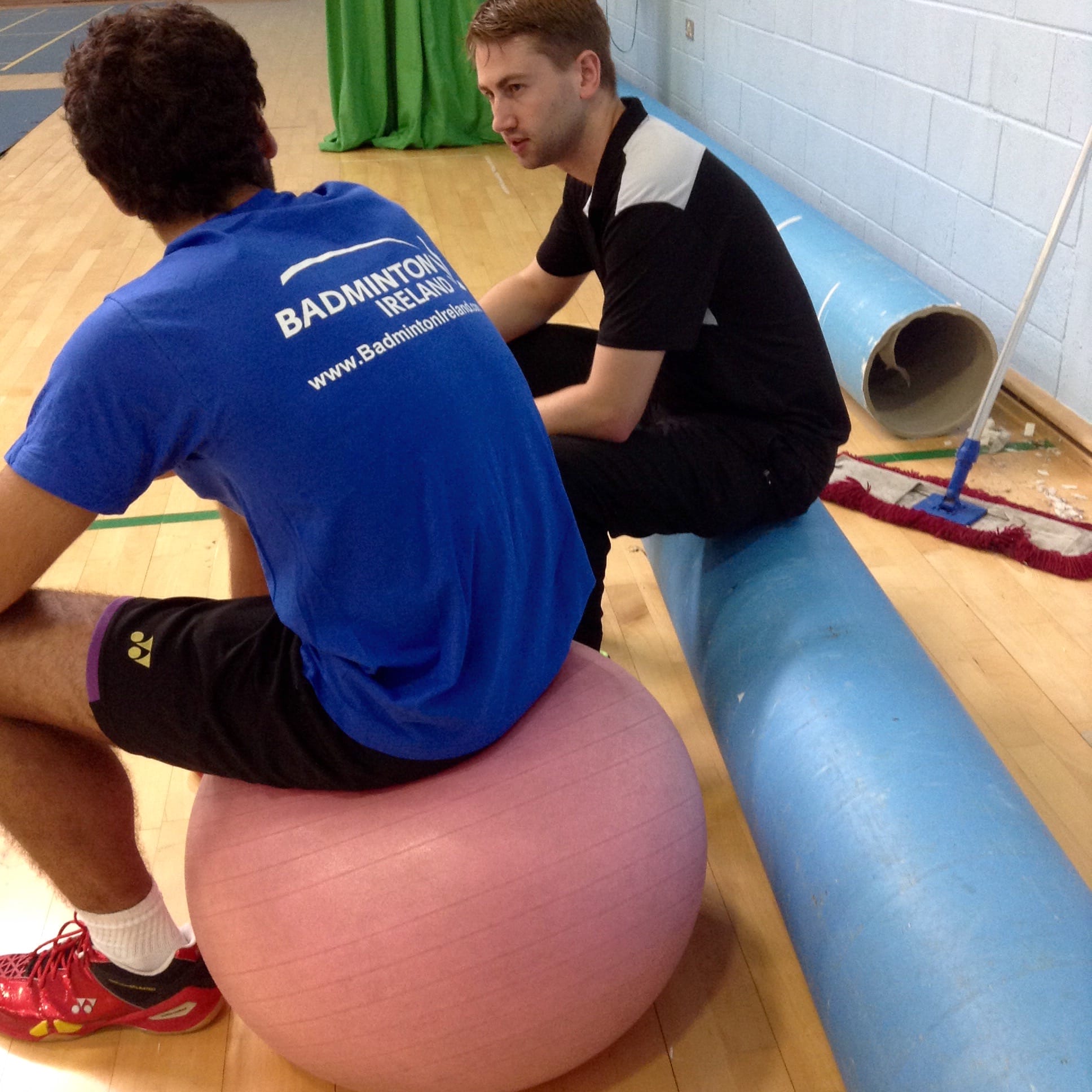 Have you ever asked a teammate or friend how they play the Big points? I’ve met several very good players who will readily share some tips and ideas.
Have you ever asked a teammate or friend how they play the Big points? I’ve met several very good players who will readily share some tips and ideas.
I’ve also met serval players and coaches who believe that it’s either a sign of weakness to ask someone else or it’s a lazy approach. I don’t agree with this.
Of course, you are entitled to your viewpoint but for me I know I can’t work everything out for myself. In fact, I welcome an opinion so that I can compare my thoughts or maybe hear something completely different.
I suggest that you don’t just walk up to other players and ask for their innermost thoughts. Be polite, be specific, show some vulnerability and be prepared to maybe answer a question or two from them.
Show them that you value their help. Explain to them how these points make you feel. You never know, they could be feeling the same as you and found ways to master these moments. Please comment below or send me a private message as I want to know what your friends advise.
I wonder what a top player would tell you if you had the opportunity to ask?
– – – – – – – – – – – – – – – –
6 Have a plan
Once you start to recognise Big points than you can start to formulate a plan. It doesn’t matter if you are serving or receiving, or its 30 mins before the match starts, you must have a plan. A plan or ritual about what to do in those moments. I am not necessarily talking about game tactics. This discussion is about you controlling your emotions brought about because you recognise the importance to the situation.
I am suggesting that you can create an ability to quickly and automatically start to control and change your emotions. This all starts with recognising the moments then triggering your plan. The plan that you have rehearsed at home, in practice and tried out in other competitions.
You may need to talk with your coach, or a sports physiologist if you can. I recommend that you create a ritual for each situation. Rituals that you can carry out and that give you confidence. I will say more about ritual in the next post “6 Ways to use the rally break”
Please don’t just expect to improve with ‘experience’. If you want to learn from previous situations you need to understand what happened and create a plan for improvement. Ask coaches or other experts and be open and honest with them. Challenge them to work with you.
You need to plan and use all your experiences.
Don’t expect improvement just from your suffering.
Work with people to improve just as you would with a stroke or movement technique issue
Summary
Take your time
If you want to improve how you prepare for and play the Big points you need to take your time. Your goal is to be prepared for these Big point emotions. Hopefully, you will now be looking forward with excitement at playing these points. As a minimum, embrace these feelings and activate your rehearsed plans from your practice.
I appreciate that you may not be in that situation right now. However, you can use the ideas here to move towards improvement and understanding. Your goal should be to prepare and practice strategies that become part of your match play.
Ok, maybe you won’t all learn to love these points!
But some players do
They feel confident and sometimes say that they ‘know’ they play better on these points
Warning
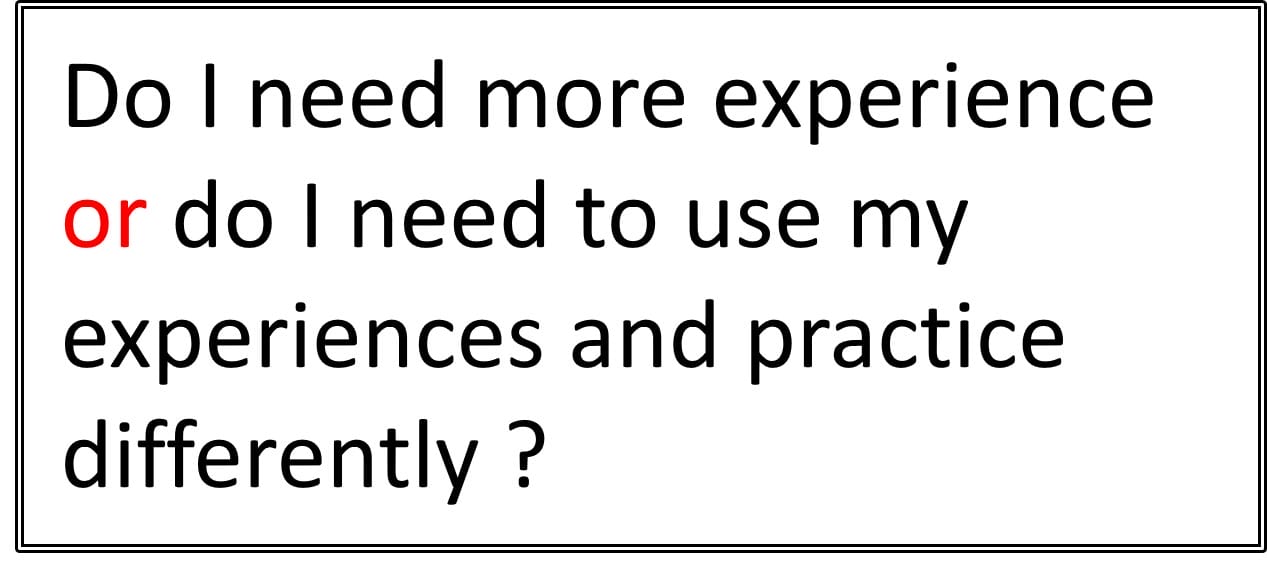 Please don’t think that all you need is experience.
Please don’t think that all you need is experience.
Being in situations where you feel stressed may help but not if you don’t plan, prepare and practice.
I’ve heard coaches and players say that all someone needs to do is reflect and think about what happened and learn from that.
However, if it is that simple then you would only need to experience these feelings once.
If it was that easy we would never see players tense up or suffer when they feel the expectations that come with these moments.
The future….
Players
You can improve, you will find that these ideas have the capability to prepare you IF you practice them.
Remember, learn to love these moments as you now have strategies that will make a difference
Coaches
Look closely at your players in competition and recognise these crucial moments
Introduce ideas to them and remember there are several ways to help them. It’s not as simple as playing practice games from 18-18
Parents
Enjoy watching how the coaches and players work together
Try to support your player throughout as it may take a while for full benefit to emerge
Look out for a future post 6 Ways to use the rally break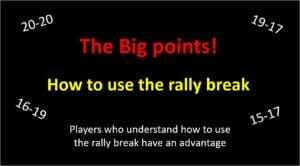

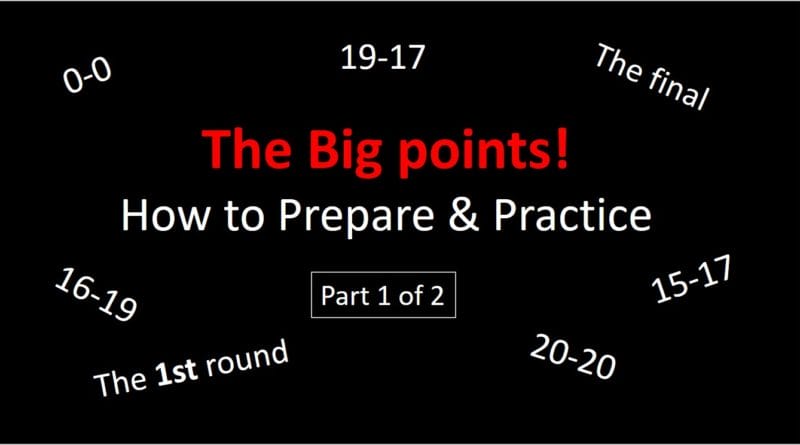
 Questions
Questions